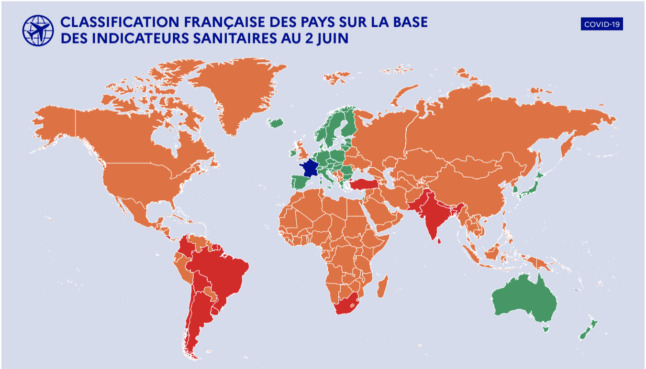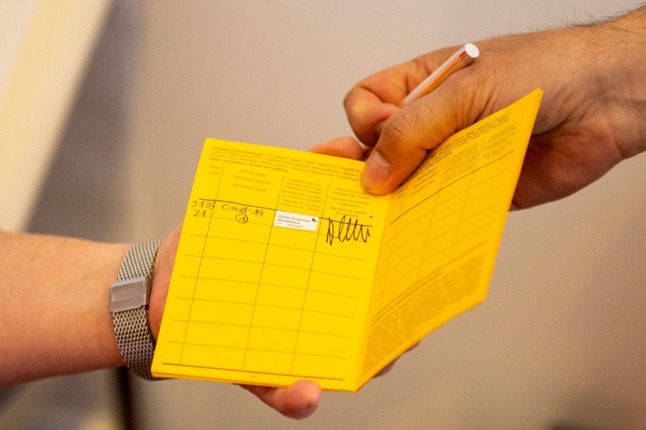Under France’s new traffic light travel system for travel, fully vaccinated visitors from orange countries including the United States, Canada, and the UK can visit freely without having to justify an essential reason for their trip or quarantine on arrival.
EXPLAINED How France’s traffic light system works for travel
They will, however, still be asked for a negative PCR test no older than 72 hours — or a negative antigen test that is no more than 48 hours old.

Non-vaccinated visitors from orange countries still have to demonstrate an essential reason for travelling, supply negative Covid-19 tests and quarantine.
In other words those who are not vaccinated are not allowed into France for a holiday or to visit friends or family or their second homes.
So who counts as ‘fully vaccinated’ in travel terms?
The French government has specified that in order to benefit from the exemptions for the fully vaccinated, travellers must
- Have received a vaccine that is approved by the European Medicines Agency – Pfizer, Moderna, AstraZeneca or Johnson & Johnson (known as Janssen in France)
- Be at least two weeks after the second injection for double-dose vaccines or for two weeks after a single dose for those people who had previously had Covid-19
- Be at least four weeks after the injection for people who had the single dose Johnson & Johnson vaccine
And how do you prove this?
This is where things get a little more tricky.
If you were vaccinated in France then you have no problems, you can use the French Covid-tracker app TousAntiCovid to display your vaccination certificate, or show a paper certificate.
If you don’t have a vaccination certificate with a QR code – here’s what to do.
If you were vaccinated in another EU country (but are travelling from outside the EU, since travel within the Bloc does not require proof of vaccination) then you can use the certificate you were given when you were vaccinated, since the EU is co-ordinating mutual recognition of member states’ certificates.
But if you were vaccinated in a non-EU country then things are unfortunately rather vague at this stage – particularly for people vaccinated in a country that does not issue digital certificates with QR codes.
The Local asked the French Interior Ministry for clarity on this point and were told: “It is possible for travellers to present proof of vaccination in a paper format or digitally via the TousAntiCovid app.”
However that doesn’t address the issue of whether non-EU vaccination certificates will be recognised – we have asked for a further clarification.
In the absence of an official answer, here is what we do know:
The UK has created an NHS app to people to prove the vaccination status. While the UK government says this can be used when travelling abroad there was no agreement in place as yet with either the EU or France for arrivals from the UK to prove their vaccinated status via this NHS app.
The Interior Ministry’s response above suggests that the French TousAntiCovid app is the only one currently being accepted at the border, but we have asked for further clarity on this.
The EU Commission has also been in talks with the United States about the development of a US Covid-19 certificate which EU states could accept as equivalent to its own.
Pending any move in those talks, an EU Commission spokesperson raised the possibility that the EU Covid certificate could be made available to citizens of the US, and perhaps other non-EU countries, on the agreement of an individual member state.
“If you’re an American not living in the EU, you could get the certificate if you ask the national authorities of a member state to give you that certificate based on some proof that you’ve been vaccinated, or had a recent Covid test,” the EU Commission spokesperson told CNN.
The spokesman did not go into detail on how this may happen in practice, and The Local has asked the Commission for further information.
If so, to adhere to the EU scheme, that document would likely need to be an official health authority vaccination certificate that bears the holder’s name and date of birth, dates when both doses were administered, as well as the name and batch number of the vaccine.
Transport Minister Jean-Baptiste Djebbari said a lack of standardised digital proof for Americans who have been vaccinated meant that they still had to provide a recent negative Covid-19 test.
“They have vaccinated lots of people but they haven’t digitised it — when you get vaccinated you often just get a sheet of paper,” Mr Djebbari told CNews on Friday.
“We’re negotiating with them – and the goal is still to open up for North America, Canada and the United States, and parts of Africa.”
We will update this story as soon as we have more information. If you are travelling, please let us know your experience with vaccine certificates at the border – [email protected]



 Please whitelist us to continue reading.
Please whitelist us to continue reading.
I’m planning to travel to France from the US next month. In addition to the CDC certificate issued to me when I received my two vaccines, I have digital proof that I was vaccinated in the form of a link to the app managed by the health care system that provided the vaccine. There is no QR code associated with the app, but the information is all there in digital form, right down to which arm/s that got the jab, and the names of the individuals who gave me my shots. If that isn’t sufficient backup for my paper certificate, I don’t know what would be.
You will also need a pcr test 72 hours prior to boarding (or antigen test 48 hrs prior to bo). I am also going to France from the US. My concern is what will be required to fly back to the US.
Hi – one of the other articles on the local https://www.thelocal.fr/20210604/explained-frances-new-traffic-light-system-for-vaccinated-travellers/ says near the bottom:
“Be at least two weeks after the second injection for double-dose vaccines or for two weeks after a single dose for those people who had previously had Covid-19”
But other articles in “the local” and in the mainstream news don’t mention this possibility – Can you confirm the if what i copied is correct please. Our party of 3 planning to travel on the 15th june have all had Covid and both jabs but one of us will only have had the second jab 7 days prior
https://twitter.com/francediplo_EN/status/1400799161784713216
this doesnt appear to be up to date
What about 2 adults from the UK fully vaccinated trying to visit with their kids (say, 9 and 11 – so un-vaccinated).
Covid is like a new TV series. We just finished season 3. We are on Season 4. Episode 1. Meaning who knows what can happen
Hi there,
I am planning on traveling from the US to France in the next few weeks as well. I have vaccine records from CVS, and will have taken a PCR test 48 hours before hand.
We were also hoping to visit friends in Italy. I was wondering if anyone knows any information about traveling from France to Italy as an American?
Since we will be coming from France, we will not be on a “COVID-Safe flight” that the Italian government has created to allow travel from the U.S. but I know that travel from France to Italy is allowed, but I don’t know if I will be allowed to travel to Italy from France as an American without being on a COVID-Safe flight – which are only available from the U.S.
Would anyone have any ideas for me or know any details about this kind of travel between the EU?
Thank you for your help!
You have to spend 14 days in the European Union before you can enter Italy as a fully vaccinated American if you have not traveled on a Covid tested flight.
Thank you very much starraeforeman. Do you know if our flight from France requires a COVID test to fly if this will be sufficient, or if it needs to be the official “COVID-safe flights”?
Thank you for your help!